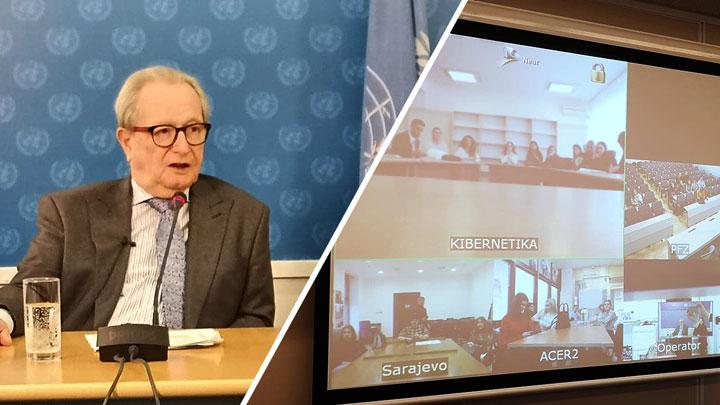President Agius delivers first lecture in the Mechanism’s Inter-University Video Lecture Programme
The Inter-University Video Lecture Programme (Programme) of the International Residual Mechanism for Criminal Tribunals (Mechanism) launched yesterday with the first lecture delivered in The Hague by the Mechanism’s President, Judge Carmel Agius, on the topic of “ICTY – Creation and Jurisdiction”.
The Programme, entitled “International Law and Facts Established before the ICTY”, brings together postgraduate students from six law faculties across the former Yugoslavia in order to initiate a dialogue about the region’s recent history, the role of the International Criminal Tribunal for the former Yugoslavia (ICTY), and principles of international criminal and humanitarian law. More than 100 students took part in yesterday’s event via video-conferencing technology, including law students from the University of Niš, the University of Podgorica, the University of Priština, the University of Sarajevo, the Ss. Cyril and Methodius University of Skoplje and the University of Zagreb.
During his lecture, President Agius provided the students with an overview of the history and political context surrounding the ICTY’s establishment, as well as its mandate and jurisdiction. He also shared personal insights into the numerous challenges the ICTY faced during its almost 25 years of existence, based on his experience as a long-serving Judge of the ICTY and its last President. President Agius emphasised the groundbreaking work of the ICTY in elaborating the elements of international crimes and establishing procedural norms, and its role in the global fight against impunity more broadly. He concluded by encouraging the new generation of lawyers in the region to defend the legacy of the ICTY, including by combating the denial of serious crimes.
Yesterday’s event was the first in a series of eight lectures that will run between November 2019 and March 2020. Students will have the opportunity to learn about the ICTY’s legacy from a number of perspectives, including from representatives of the Mechanism’s Office of the Prosecutor, Registry, Chambers, and the Defence. All lectures will be filmed by the Mechanism and made available to the respective law faculties for future presentations to their students.
The Programme forms part of the wider Mechanism’s Information Programme for Affected Communities (MIP), launched in January 2019, which aims to contribute to an increased awareness and knowledge among affected communities about the 1990s conflicts in the former Yugoslavia, based on ICTY and Mechanism cases. The MIP is generously supported by the European Union.

The Inter-University Video Lecture Programme (Programme) of the International Residual Mechanism for Criminal Tribunals (Mechanism) launched yesterday with the first lecture delivered in The Hague by the Mechanism’s President, Judge Carmel Agius, on the topic of “ICTY – Creation and Jurisdiction”.
The Programme, entitled “International Law and Facts Established before the ICTY”, brings together postgraduate students from six law faculties across the former Yugoslavia in order to initiate a dialogue about the region’s recent history, the role of the International Criminal Tribunal for the former Yugoslavia (ICTY), and principles of international criminal and humanitarian law. More than 100 students took part in yesterday’s event via video-conferencing technology, including law students from the University of Niš, the University of Podgorica, the University of Priština, the University of Sarajevo, the Ss. Cyril and Methodius University of Skoplje and the University of Zagreb.
During his lecture, President Agius provided the students with an overview of the history and political context surrounding the ICTY’s establishment, as well as its mandate and jurisdiction. He also shared personal insights into the numerous challenges the ICTY faced during its almost 25 years of existence, based on his experience as a long-serving Judge of the ICTY and its last President. President Agius emphasised the groundbreaking work of the ICTY in elaborating the elements of international crimes and establishing procedural norms, and its role in the global fight against impunity more broadly. He concluded by encouraging the new generation of lawyers in the region to defend the legacy of the ICTY, including by combating the denial of serious crimes.
Yesterday’s event was the first in a series of eight lectures that will run between November 2019 and March 2020. Students will have the opportunity to learn about the ICTY’s legacy from a number of perspectives, including from representatives of the Mechanism’s Office of the Prosecutor, Registry, Chambers, and the Defence. All lectures will be filmed by the Mechanism and made available to the respective law faculties for future presentations to their students.
The Programme forms part of the wider Mechanism’s Information Programme for Affected Communities (MIP), launched in January 2019, which aims to contribute to an increased awareness and knowledge among affected communities about the 1990s conflicts in the former Yugoslavia, based on ICTY and Mechanism cases. The MIP is generously supported by the European Union.